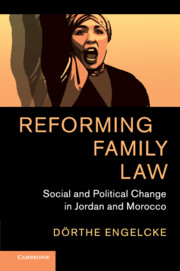Crossref Citations
This Book has been
cited by the following publications. This list is generated based on data provided by Crossref.
2019.
Promoting Democracy, Reinforcing Authoritarianism.
p.
257.
Engelcke, Dörthe
2019.
Filiation and the Protection of Parentless Children.
p.
135.
2019.
Book Notes.
Law & Social Inquiry,
Vol. 44,
Issue. 03,
p.
851.
Engelcke, Dörthe
2019.
ESTABLISHING FILIATION (NASAB) AND THE PLACEMENT OF DESTITUTE CHILDREN INTO NEW FAMILIES: WHAT ROLE DOES THE STATE PLAY?.
Journal of Law and Religion,
Vol. 34,
Issue. 3,
p.
408.
2020.
Winning Lebanon.
p.
216.
Wagemakers, Joas
2020.
The Muslim Brotherhood in Jordan.
Sheline, Annelle
2021.
Evaluating the Resonance of Official Islam in Oman, Jordan, and Morocco.
Religions,
Vol. 12,
Issue. 3,
p.
145.
Shanneik, Yafa
2021.
Displacement, humanitarian interventions and gender rights in the Middle East: Syrian refugees in Jordan as a case study.
Journal of Ethnic and Migration Studies,
Vol. 47,
Issue. 15,
p.
3329.
Sayeed, Asma
2022.
ʿUlūm al-Qurʾānand the Diffusion of a New Methodology: A Rare Female Contribution to Qur’anic Sciences.
Journal of Qur'anic Studies,
Vol. 24,
Issue. 2,
p.
48.
2022.
Creating Consent in an Illiberal Order.
p.
231.
Engelcke, Dörthe
2022.
Between Church and State: The Challenges of Reforming the Church Courts and Family Law in the Greek Orthodox Patriarchate of Jerusalem.
International Journal of Middle East Studies,
Vol. 54,
Issue. 2,
p.
282.
Id-youss, Lahousseine
and
Alsulaiman, Abied
2023.
Handbook of Terminology.
Vol. 3,
Issue. ,
p.
224.
Barnett, Carolyn
2023.
Women’s Rights and Misperceived Gender Norms Under Authoritarianism.
Comparative Political Studies,
Jones, Calvert W.
and
Mitchell, Jocelyn Sage
2023.
Women reporters as experts on security affairs in Jordan? Rethinking gender and issue competency stereotypes.
Mediterranean Politics,
Vol. 28,
Issue. 3,
p.
434.
Sezgin, Yüksel
2023.
A global and historical exploration: Legislative reform in Muslim family laws in Muslim‐majority versus Muslim‐minority countries.
Law & Policy,
Vol. 45,
Issue. 2,
p.
110.
Kerras, Hayet
Bautista, Susana
and
de-Miguel Gómez, María Dolores
2023.
Wo-MENA paradox: glass ceiling or sticky floor?.
The Journal of North African Studies,
Vol. 28,
Issue. 4,
p.
976.
YALÇIN, İsmail
2023.
Bazı İslam Ülkeleri Aile Kanunlarında Kocanın Boşamasının Sınırlandırılması.
Bilimname,
p.
117.
El Mekkaoui, Najat
Loukili, Sara
Fourouheshfar, Yeganeh
and
Eissa, Nada
2024.
For Labor or for Divorce?: Unilateral Divorce Laws and Women’s Labor Outcomes.
Maktabi, Rania
2024.
Kvinners adgang til skilsmisse i arabiske stater 1956–2021: Familierett, statsbygging og utvidet medborgerskap.
Tidsskrift for kjønnsforskning,
Vol. 48,
Issue. 1,
p.
22.
Yavuz Altıntaş, Miyase
2024.
Müslüman Çoğunluklu Ülkelerde Aile Hukukuyla İlgili Kanunların Tarihi Seyri.
Diyanet İlmi Dergi,
Vol. 60,
Issue. 2,
p.
655.



